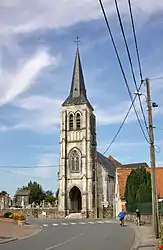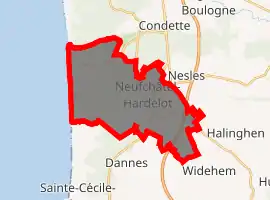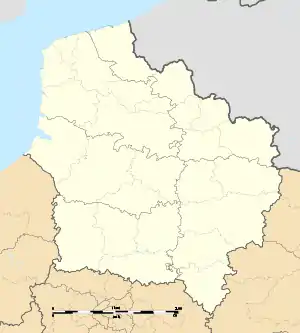Neufchâtel-Hardelot
Neufchâtel-Hardelot is a commune in the Pas-de-Calais department in the Hauts-de-France region of France.
Neufchâtel-Hardelot | |
|---|---|
 The church of Neufchâtel-Hardelot | |
 Coat of arms | |
Location of Neufchâtel-Hardelot 
| |
 Neufchâtel-Hardelot  Neufchâtel-Hardelot | |
| Coordinates: 50°37′N 1°38′E | |
| Country | France |
| Region | Hauts-de-France |
| Department | Pas-de-Calais |
| Arrondissement | Boulogne-sur-Mer |
| Canton | Outreau |
| Intercommunality | Communauté d'agglomération du Boulonnais. |
| Government | |
| • Mayor (2020–2026) | Paulette Juilien-Peuvion[1] |
| Area 1 | 20.85 km2 (8.05 sq mi) |
| Population (2017-01-01)[2] | 3,746 |
| • Density | 180/km2 (470/sq mi) |
| Time zone | UTC+01:00 (CET) |
| • Summer (DST) | UTC+02:00 (CEST) |
| INSEE/Postal code | 62604 /62152 |
| Elevation | 4–155 m (13–509 ft) (avg. 56 m or 184 ft) |
| 1 French Land Register data, which excludes lakes, ponds, glaciers > 1 km2 (0.386 sq mi or 247 acres) and river estuaries. | |
The commune houses a PGL hotel named Le Pré Catelan.
Geography
Neufchâtel-Hardelot is a farming and tourist town of forests, golf courses and beaches, situated some 8 miles (13 km) south of Boulogne, at the junction of the D940, D308 and D215 roads. Junction 27 of the A16 autoroute is just within the commune’s territory, the western border of which is formed by the English Channel.
History
At the end of the 7th century, the grassy dunes area was known as "Mont Saint-Frieux", 153 metres above sea level, where a village was first built. The name later became Saint-Férieux.
The name Neufchâtel has its origins in a castle, in this case the Chateau de Bellefontaine, which was engulfed by shifting sands. This may be the "Novum Castellum" that gave its name to Neufchâtel. Opinion is divided. The name Neufchâtel was recorded here for the first time in 1173 and again in 1199 in the charter of Samer.
In the early 1900s, Hardelot was lined with white sand dunes facing the sea and a 600 hectares (1,500 acres) forest. It attracted many hunters of deer, wild boar, hares, rabbits, partridge, snipe and pheasant.
In 1905, an English patron, John Robinson Whitley, and his French friends bought 400 hectares (990 acres) hectares of land and created the Hardelot company. Whitley had already owned Hardelot castle since 1897, and was one of the promoters of Le Touquet-Paris-Plage. He wanted to develop Hardelot as a new and fashionable resort and a world centre of sports.
From 1908 onwards, 20 new villas were built around the tennis courts on the seafront by the famous architect Louis-Marie Cordonnier, a friend of John Whitley, who designed these vast and unique villas that today characterize Hardelot. In 1911, aviator Louis Blériot had a villa built near the levee. Harriet Quimby, the first woman to fly across the Channel, flew from Dover to Hardelot-Plage on 16 April 1912.[3] Around that time, some of the first land yachting races were held here, attracting many followers to the beach.
During the Second World War, Hardelot was occupied and looted by the Germans and blown up by Allied bombing in 1944.
Since then, Hardelot-Plage has been rebuilt. It is still littered with the numerous villas hidden in pine forests which have made its name. It is also a prominent sporting place with two golf courses as well as tennis and equestrian clubs.
Population
| Year | Pop. | ±% p.a. |
|---|---|---|
| 1968 | 2,007 | — |
| 1975 | 2,392 | +2.54% |
| 1982 | 2,712 | +1.81% |
| 1990 | 3,035 | +1.42% |
| 1999 | 3,585 | +1.87% |
| 2007 | 3,784 | +0.68% |
| 2012 | 3,749 | −0.19% |
| 2017 | 3,746 | −0.02% |
| Source: INSEE[4] | ||
Places of interest
- The church of St.Pierre, dating from the sixteenth century.
- A house named after the singer Madonna.
- Saint-Augustin’s church at Hardelot.
- The thirteenth century castle.
- Two ancient manorhouses.
References
- "Répertoire national des élus: les maires". data.gouv.fr, Plateforme ouverte des données publiques françaises (in French). 2 December 2020. Retrieved 7 December 2020.
- "Populations légales 2017". INSEE. Retrieved 6 January 2020.
- "Miss Quimby flies English Channel" (PDF). The New York Times. April 17, 1912.
- Population en historique depuis 1968, INSEE
External links
| Wikimedia Commons has media related to Neufchâtel-Hardelot. |